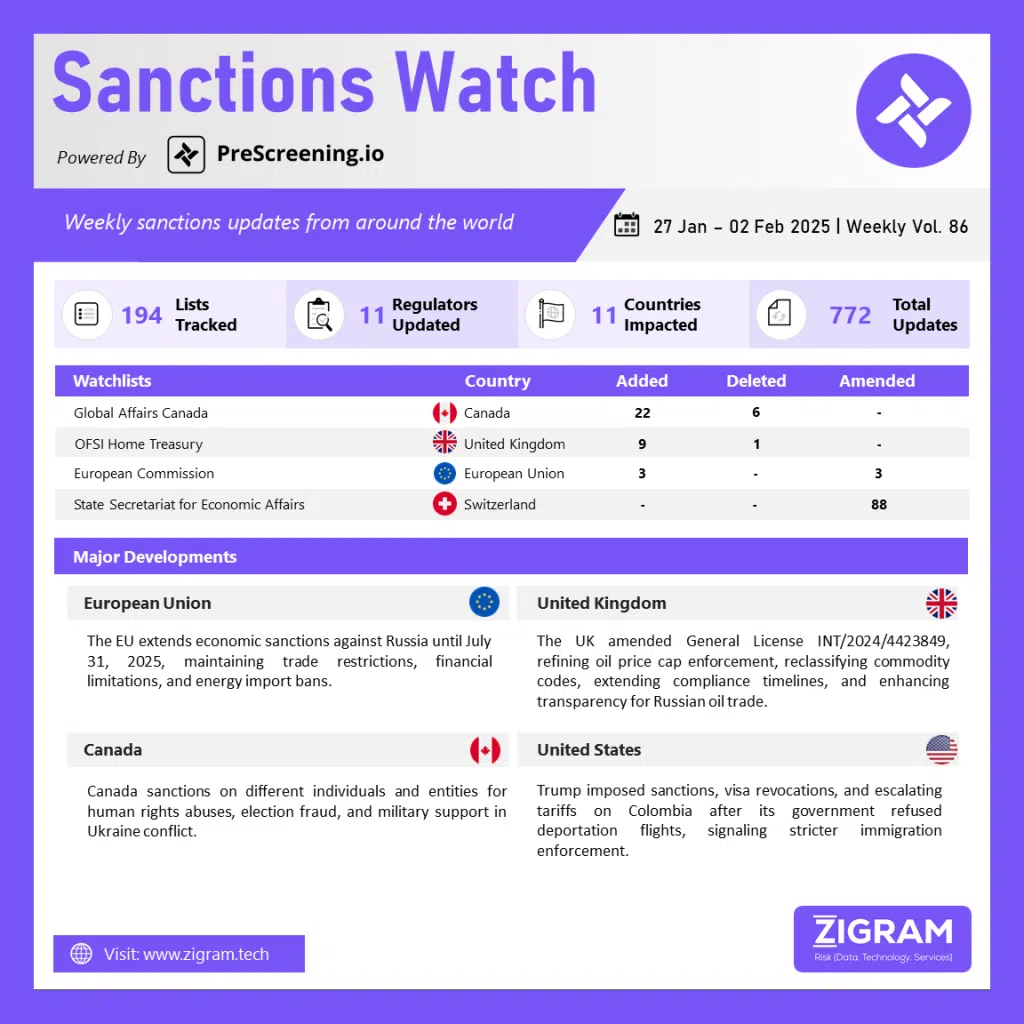Sanctions Watch Vol 86
In the latest edition of our Sanctions Watch weekly digest, we present significant updates on sanction watchlists and regulatory developments.
1. EU Renews Economic Sanctions Against Russia
The Council of the European Union extended its economic restrictive measures against Russia for an additional six months, until July 31, 2025. These sanctions, initially imposed in 2014 and expanded since February 2022, encompass a broad range of sectoral measures, including trade restrictions, financial limitations, and bans on the import of seaborne crude oil and certain petroleum products from Russia to the EU. The Council emphasized that as long as Russia’s actions continue to violate international law, the EU will maintain and potentially escalate these measures.
2. UK Updates Oil Price Cap General License, Extends Compliance Measures
The UK’s Office of Financial Sanctions Implementation (OFSI) amended General Licence INT/2024/4423849 under the Russia (Sanctions) (EU Exit) Regulations 2019. This update revises the Combined Nomenclature (CN) / Harmonized System (HS) commodity code for “Premium to Crude,” reclassifying it from 2710 19 43 to 2710 19 42.
The Oil Price Cap, introduced in December 2022, limits the sale of Russian crude oil to $60 per barrel, with premium and discount oil categories priced at $100 and $45 per barrel, respectively. It ensures Russian oil continues to flow to third countries while restricting Moscow’s revenue from oil exports.
Earlier amendments to the licence in March and May 2024 adjusted compliance timelines, extending the attestation reporting period from 28 to 30 days, and excluded specific vessels from coverage. The UK continues to refine enforcement mechanisms, requiring providers to document price attestations and ancillary costs on a per-voyage basis. These updates aim to enhance transparency and compliance among shipping and financial entities involved in the Russian oil trade. The licence remains in effect until further notice from OFSI.
3. Canada Imposes New Sanctions on Belarus for Election Fraud and Human Rights Violations
Canada has announced sanctions on different individuals and entities in response to ongoing human rights violations and support for military actions in Ukraine. The measures target those linked to electoral fraud, repression of civil society, and the military-industrial complex supplying weapons to conflict zones. The move follows a contested election, widely condemned as undemocratic, and aligns with international efforts to counter external influence. Sanctions include asset freezes and restrictions on military-linked entities. Canada, in coordination with the UK, reaffirms its commitment to supporting democratic forces and human rights in the region.
4. Trump Imposes Sanctions on Colombia Over Deportation Dispute
U.S. President Donald Trump announced sanctions and tariffs against Colombia after its government rejected deportation flights of Colombian nationals. Trump declared immediate visa revocations for Colombian officials and supporters of President Gustavo Petro, alongside heightened airport screenings. Additionally, tariffs on Colombian goods will start at 25%, rising to 50% within a week. While the legality of these measures under the U.S.-Colombia free trade agreement remains uncertain, the move marks a significant shift in diplomatic relations. Trump emphasized that these actions are the first step in enforcing stricter immigration policies.
Know more about the product: PreScreening.io
Click here to book a free demo.
Sanctions Watch is a weekly recap of events and news related to sanctions around the world.
- #OFAC
- #RussiaSanctions
- #HumanRights
- #ForeignPolicy
- #USSanctions
- #EUSanctions
- #RussiaSanctions
- #EconomicSanctions
- #HumanitarianAid
- #CanadaSanctions
- #HumanRights
- #ElectionFraud
- #AssetFreeze
- #TradeRestrictions
- #MilitarySanctions
